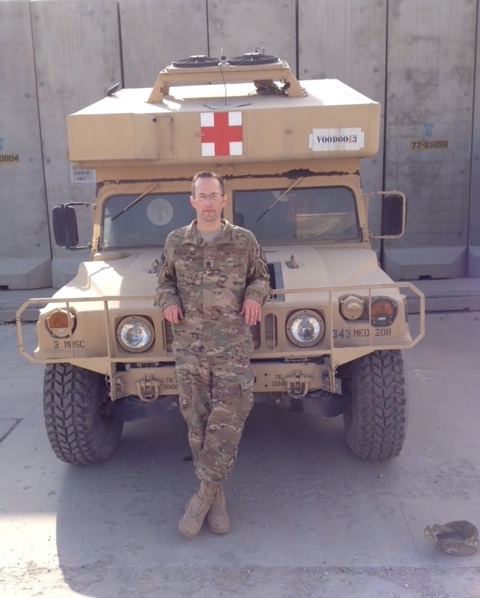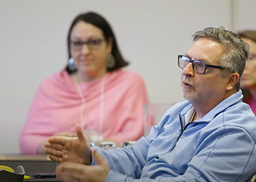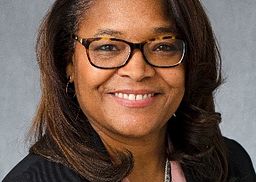Veterans Day: A Q&A With Veteran and PA Educator Christopher Howell
From the profession’s start, veterans have played an essential role in PA education, clinical training, and practice. This Veterans Day, PAEA honors veterans who have contributed their service on the battlefield and in the clinic.
Highlighting the value of military service in medical practice, United States Air Force Veteran and Miami University PA Program Director Christopher Howell, DSc, MPAS, PA-C shares his perspectives and experiences as a proud veteran and PA educator in this Q&A:

What factors or experiences influenced your decision to pursue military service and also a career in the health professions? What experiences then influenced your decision to enter PA education?
My Father’s military career had the greatest impact on my own ambitions toward a service in the profession of arms. Interestingly, he served in the Air Force and the Army, spoke very highly of both as well as the honor he felt in his career selection. Without question, he was enormously proud. I knew since childhood that I wanted to be a part of a team and have something I could be similarly proud of, and decided early that I too would join the military. I remain grateful to him for the commitment he made in assisting me in selecting the branch of service most suited to my strengths and my holistic short and long-term goals. In turn, I will forever be indebted to our nation, Department of Defense, and the United States Air Force in not only allowing me the opportunity to serve, but also in investing so much in helping me see those goals be realized.
Remarkably, when I joined the military, the only resolute conviction that I had was that I wanted to be in the military. That aside, I cared very little as to the duties that would be asked of me once my commitment began- all I ever wanted was the opportunity to serve.
Through a series of events, I was actually “assigned” a role as a medic. Though I had never thought of a career in medicine prior to this role, the training was amazing! I recall relishing every opportunity to learn more throughout instruction, observation, and clinical application experiences. In fact, there was a part of me at the end of my technical school that was disappointed that the training was over—as every day was a learning opportunity with brilliant educators in pre-hospital and hospital care.
Yet, it was during my first assignment that I met and was mentored by a PA. This provider began a dialogue with me, opened my eyes to the possibility of a career in medicine, and encouraged me to consider that such opportunities were available to me in military health professions. He continued to invest in me over the following year. It was his mentorship that instilled in me a passion for clinical medicine that exceeded my early expectations and gave me the confidence to see new goals develop and ultimately become reality.
How has your experience in the Air Force enriched your practice, both as a clinician and an educator?
My practice would not have been possible without my experience in the United States Air Force. I was offered an opportunity to attend the Interservice Physician Assistant Program (IPAP) while on active duty. This intensive training prepared me not only for clinical preventive medicine, but for health leadership and fiscal responsibility—something that I hope to instill in my students during their time within me in the classroom and community. This foundational training led to an amazing career and even more opportunities that continue to grow.
How does military medical service set PAs and PA school applicants apart?
Veterans serving their country frequently have a sense of duty looking beyond their own interests, instead extending to prioritizing service to their teams and community. The military, regardless of the branch, frequently establishes a sense of selfless duty to a mission and vision that will undermine one’s self-interests in favor of the greater good. This is easily exemplified in the Air Force core values of “service before self.”
For healthcare professionals, we are frequently called upon to perform our duties in a similar manner. We are expected to act selflessly to ensure the preservation of health and life with dignity and respect while establishing a connection with our patients and their families—all in service to our communities.
Frequently, this requires extending ourselves “beyond our limits” to provide that care which inspired us to our most noble craft.
Do you have any advice for those who are transitioning from the military to PA school or PA education?
Those entering PA school or PA education will likely experience a lot of uncertainty about such a seemingly bold step. It’s difficult to know how best to prepare as prospective PA students and educators encounter advice that could be broadly applied to every person or every journey.
There may be notable differences in civilian life and graduate medical education. Yet, one could argue that the same indelible commitment to mission engagement that one experienced while in the service would still apply in a post-military life.
I think what is unique for civilian experience, as compared to military service, is the opportunity to define the mission yourself. In light of that, by having a vision and establishing goals, one can fully commit to them and perform with the same tenacity that supported them in military service — with great success.
Access resources to support service members making the transition into civilian PA practice or education on the PA Education for Veterans page.




